Home
/ About Egypt / Egypt country profile
Egypt country profile
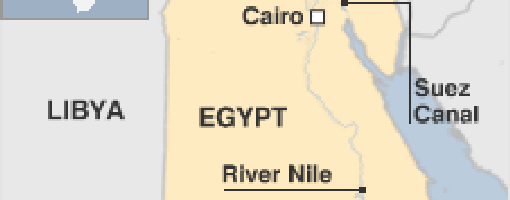
Created: Apr 04, 2010,
modified: Jan 13, 2012,
overall rating: 0.000
While bestknown for its pyramids and ancient civilisations, Egypt has played acentral role in Middle East politics in modern times.
Itswars with Israel in 1948, 1956, 1967 and 1973, then its eventual peacewith its adversary in 1979, have seen Egypt move from being a warringnation to become a key representative in the peace process.
Overview
Egypt'sancient past and the fact that it was one of the first Middle Easterncountries to open up to the West following Napoleon's invasion havegiven it a claim to be the intellectual and cultural leader in theregion. The head of Cairo's Al-Azhar Mosque is one of the highestauthorities in Sunni Islam.
But the historic step by PresidentAnwar Sadat to make peace with Israel in the 1979 Camp David agreementled to Egypt being expelled from the Arab League until 1989, and in 1981Mr Sadat was assassinated by Islamic extremists angry at his moves toclamp down on their activities.
Since then, President HosniMubarak has taken a more moderate line, but Islamic groups havecontinued their campaigns sporadically, being responsible for deadlyattacks that have often targeted tourists and resort areas.
Campaignersfor political reform have become more vocal in recent times and havetaken to the streets in defiance of an emergency law, in force since1981. Activists say the law restricts political expression.
AlthoughEgypt has changed its constitution to allow the opposition to contestpresidential polls, potential candidates must meet strict criteria forparticipation. A ban remains on religious political parties.
Egypt'steeming cities - and almost all agricultural activity - areconcentrated along the banks of the Nile, and on the river's delta.Deserts occupy most of the country.
The economy depends heavilyon agriculture, tourism and cash remittances from Egyptians workingabroad, mainly in Saudi Arabia and the Gulf countries.
However,rapid population growth and the limited amount of arable land isstraining the country's resources and economy.
Facts
* Full name: Arab Republic of Egypt
* Population: 83 million(UN, 2009)
* Capital: Cairo
* Area: 1 million sq km(386,874 sq miles)
* Major language: Arabic
* Majorreligions: Islam, Christianity
* Life expectancy: 68 years (men),72 years (women) (UN)
* Monetary unit: 1 Egyptian Pound = 100piastres
* Main exports: Petroleum, petroleum products and cotton
* GNI per capita: US $1,800 (World Bank, 2008)
* Internetdomain: .eg
* International dialling code: +20
Leaders
President:Muhammad Hosni Mubarak
Hosni Mubarak is Egypt's longest-servingruler since Muhammad Ali in the early 19th century and one of thelongest-serving leaders in the Arab world.
He gained a fifthconsecutive term in presidential elections in September 2005, when hewas aged 77. The poll was the first under a new system which allowsmultiple candidates to stand. In previous elections Egyptians voted yesor no for a single candidate appointed by parliament.
However, theonly opposition organisation which has broad public support, the MuslimBrotherhood, is banned from open political activity and could not field acandidate.
Mr Mubarak succeeded Anwar Sadat, who wasassassinated in 1981. He is seen as Egyptian politics' great survivor,having escaped no fewer than six assassination attempts.
Thepresident is an economic liberal and his government has promisedeconomic reforms. But Egypt remains plagued by high unemployment and lowstandards of living.
Mr Mubarak has pursued friendlyrelations with the West, breaking the isolation imposed on Egypt by Arabcountries opposed to peace with Israel.
As a military man hemodernised the air force after Egypt's defeat in the six-day war withIsrael in 1967. He helped to plan the 1973 Yom Kippur War - anEgyptian-Syrian attack on Israeli forces on the Suez Canal and in theGolan Heights.
The succession has been hotly debated. Reportsthat Mr Mubarak's younger son Gamal is being groomed for office haveangered the opposition and have been denied by the president.
InMarch 2010, Mr Mubarak underwent gall-bladder surgery in Germany,renewing speculation over whether he will run for re-election in 2011.
Since1952, when army officers led by Gamal Abdel Nasser overthrew themonarchy, Egyptian leaders have been drawn from the military.
HosniMubarak was born in 1928. He and his wife Suzanne, who is part Welshand part Egyptian, have two sons, Ala and Gamal.
Media
Egyptis a major regional media player. Its press is one of the mostinfluential and widely-read in the region, and its TV and film industrysupplies much of the Arab-speaking world with shows from its MediaProduction City, an enterprise which was set up to create the "Hollywoodof the East".
Media criticism of the government is commonplace,but press laws which allow prison sentences for libelling the president,state institutions and foreign heads of state remain in place.
Thereare two state-run national TV channels and six regional channels, butmany viewers turn to pan-Arab channels for their news. Egypt is a bigforce in satellite TV; its Space Channels are popular across theArabic-speaking world. Broadcasters can tap into a majorprogramme-making industry and have access to a large film archive.
Egyptwas the first Arab nation to have its own satellite, Nilesat 101.Private satellite TV stations include Dream 1, Dream 2 and Al-Mihwar TV.The state's radio monopoly was broken with the arrival of private,commercial music stations in 2003.
Six million Egyptians wereonline by 2007 (InternetWorldStats.com). Bloggers have made theirpresence felt, some of them emerging as a force of political opposition.
Mediafreedom body Reporters Without Borders added Egypt to its list of"internet enemies" in 2006 over the arrests of bloggers duringpro-democracy demonstrations.
The press
*Al-Ahram - state-owned daily, the oldest newspaper in the Arab world
* Al-Ahram Weekly - English-language
* Al-Jumhuriyah -state-owned daily
* Al-Akhbar - semi state-owned daily
*Al-Ahali - opposition
* Al-Wafd - opposition
* Al-Messa -pro-government
* Middle East Times - English-language weekly
Television
* Egypt Radio Television Union (ERTU) - state-run, operates domesticand satellite networks, including Nile TV International and Nile TVthematic channels
* Dream TV - privately-owned satellite network,operates Dream 1 targeting young viewers and Dream 2, an entertainmentchannel
* Al-Mihwar - private, via satellite
Radio
* Egypt Radio Television Union (ERTU) - state-run, operates eightnational networks and external services Radio Cairo and Voice of theArabs
* Nile FM - private, Western pop
* Nogoum FM -private, Arabic pop
News agency
* Middle EastNews Agency (MENA) - state-run
BBC News
Your Rating:
Overall rating: 0.000
Totally voted: 0
Comments
Login/Registration
Weather in:
Exchange Rates
1 USD = 16.200 LE
1 EUR = 18.040 LE
News
-
IMF loan expected next month
Apr 22, 2013, rating: 3.000, 3 votes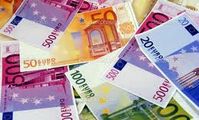 Egypt may secure an International Monetary Fund loan agreement in about amonth, state news agency MENA reported, quoting "informed" sources ...
Egypt may secure an International Monetary Fund loan agreement in about amonth, state news agency MENA reported, quoting "informed" sources ...
-
Egypt received 11 million tourists in 2012 and aims to boost that number to 14 million in 2013.
Jan 22, 2013, rating: 3.000, 2 votes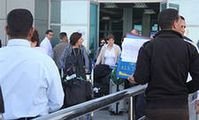
Egypt received 11 million tourists in 2012 and aims to boost that number to 14 million in 2013.
-
Egypt limits travelers leaving country to US$10,000 in cash
Dec 26, 2012, rating: 3.250, 4 votes Egypt has banned travelers from carrying more than US$10,000 in foreigncurrency cash in or out of the country ...
Egypt has banned travelers from carrying more than US$10,000 in foreigncurrency cash in or out of the country ...
-
National Coalition on Climate Change for Egypt is born
Nov 30, 2012, rating: 5.000, 1 votes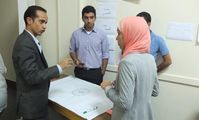 The global COP18 conference on climate change opens in Doha Monday.About 17,000 participants from all over the world ...
The global COP18 conference on climate change opens in Doha Monday.About 17,000 participants from all over the world ...
-
Judgment for sexual harassment
Nov 14, 2012, rating: 3.600, 5 votes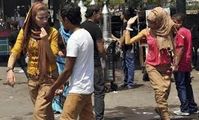 A man was sentenced to two years in prison and fined LE 2,000 for sexually harassing a woman, an ...
A man was sentenced to two years in prison and fined LE 2,000 for sexually harassing a woman, an ...
-
Scientists are enthusiastic about hydrogen's green applications
Nov 13, 2012, rating: 4.000, 3 votes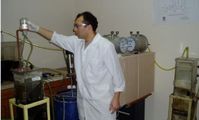
As fossil fuel reserves decrease, many countries are turning to hydrogen as one of the main sources of alternative energy ...








